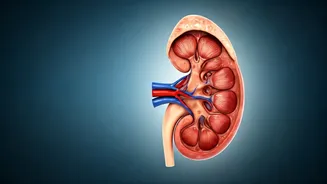Excessive Salt Intake
One of the most detrimental habits for kidney health is consuming excessive sodium. The cardiologist emphasizes that high salt intake elevates blood pressure,
placing undue stress on the kidneys. Over time, this constant strain can lead to kidney damage and compromise their ability to filter waste effectively. It's crucial to be mindful of hidden sources of sodium in processed foods, packaged meals, and even common condiments. Reducing salt intake isn't just about avoiding the salt shaker; it involves making informed dietary choices. Reading food labels carefully and opting for fresh, unprocessed foods can significantly reduce sodium consumption and protect kidney function. Furthermore, the Indian diet can be quite high in salt, so being extra vigilant is vital. Gradual reduction is easier to implement and helps your taste buds adjust, making it a sustainable change. Focusing on flavorful herbs, spices, and lemon juice can enhance food without adding salt, thus keeping your kidneys happy and healthy.
Insufficient Water Consumption
Dehydration is another significant threat to kidney health. The cardiologist advises that not drinking enough water can lead to a buildup of toxins and waste products in the body, placing strain on the kidneys' filtration processes. Kidneys need adequate fluid to function correctly, enabling them to flush out harmful substances and maintain overall health. Inadequate water intake can lead to kidney stones, urinary tract infections, and even chronic kidney disease over time. Staying hydrated doesn't have to be a chore; carrying a water bottle and sipping water throughout the day is an easy way to meet your hydration needs. Setting reminders and tracking water consumption can also help you stay on track. Besides water, you can also include hydrating foods like fruits and vegetables with high-water content in your diet. However, sugary beverages don't count as healthy hydration sources and can instead cause additional problems for kidney health. So, embrace the power of water to support your kidney function and enhance overall well-being.
Overuse of Painkillers
The cardiologist highlights the dangers of frequently taking over-the-counter pain relievers, particularly nonsteroidal anti-inflammatory drugs (NSAIDs). These medications, while effective for pain relief, can be nephrotoxic, which means they can damage the kidneys, especially when used excessively or for long durations. Regular use of NSAIDs can lead to kidney inflammation, reduced blood flow to the kidneys, and even kidney failure. It is essential to be cautious about the frequency and dosage of these medications, and it’s advisable to consult with a doctor before using them regularly. If you require long-term pain management, exploring alternative options such as physical therapy or natural remedies under medical supervision is important. Always prioritize your health by understanding the potential risks associated with commonly used medications. When taking any medication, always follow the recommended dosage and seek medical advice if you experience any side effects or have existing kidney problems to protect kidney health.
Excessive Protein Consumption
Consuming an excessive amount of protein can be another burden on the kidneys. While protein is crucial for body function, the kidneys must work harder to filter out the waste products generated during protein metabolism. A diet excessively rich in protein, especially animal protein, can overwork the kidneys, potentially leading to long-term damage, particularly in individuals with existing kidney issues. The cardiologist recommends maintaining a balanced diet with moderate protein intake, emphasizing the importance of diverse food sources. Focus on incorporating lean protein sources such as fish, poultry, beans, and lentils. Make sure that you balance your protein intake with carbohydrates and healthy fats. Listening to your body and consulting with a healthcare professional or a registered dietitian can help you determine the right amount of protein based on your individual needs and health conditions. By making dietary adjustments, you can support your kidneys and overall health.
Ignoring Frequent Infections
Ignoring frequent or recurring infections, especially urinary tract infections (UTIs), is a dangerous habit that can harm your kidneys. Untreated or poorly treated UTIs can spread to the kidneys, causing a more severe infection known as pyelonephritis. This can result in inflammation and permanent damage to the kidney tissue. The cardiologist stresses the importance of addressing any signs of infection promptly. Early symptoms of a UTI include frequent urination, a burning sensation during urination, and cloudy or bloody urine. If you experience these symptoms, consulting a healthcare professional is crucial. Prompt treatment with antibiotics can prevent the infection from spreading to the kidneys. Besides seeking medical help, practices such as drinking plenty of water, practicing good hygiene, and urinating after sexual activity can reduce the risk of UTIs. Taking proactive steps and quickly addressing any infections is essential to protect your kidney health and prevent potentially severe complications.












